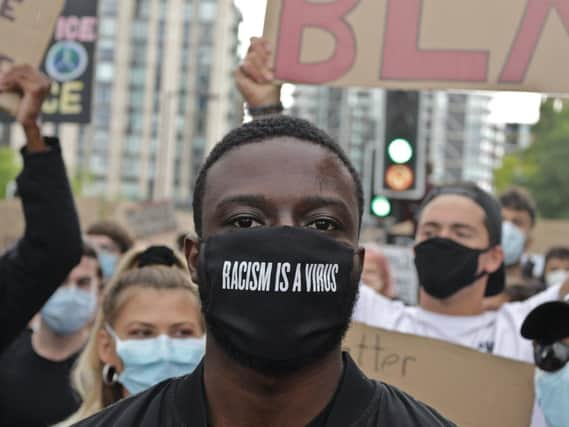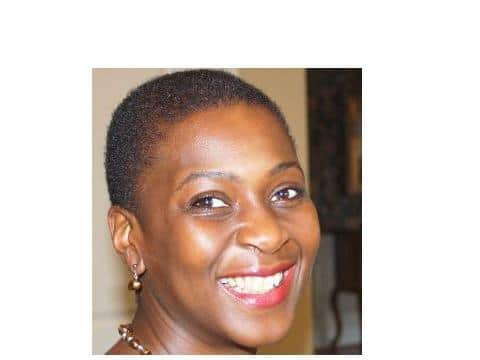Leeds professor leading new £2.5m study into impact of 'twin viruses' Covid-19 and racial discrimination on communities


For the past year, extraordinary efforts have been made by society to tackle Covid-19 and there are growing hopes that mass vaccination programmes made possible by the stunning work of scientists can lead us back to relative normality in the months to come.
But in an ideal world, Professor Iyiola Solanke would like to see a similarly unified and concentrated approach applied to another problem which has been with us for much longer and does not appear to be disappearing anytime soon - that of racial discrimination.
Advertisement
Hide AdAdvertisement
Hide AdProfessor Solanke, from the University of Leeds and a member of the official Scientific Pandemic Insights Group on Behaviours which advises the Government, says the Covid crisis has made longstanding inequalities in areas like health, employment and education even worse for those in minority groups.


“I agree with what other commentators have said - Covid has exacerbated in a stark and cruel way the depth of inequalities that exist in British society - not just in terms of race but also disability and age,” she says.
“If we took such a multi-level approach to tackling discrimination as we have to the virus, we might be able to get at what is driving these ongoing inequalities and take positive action.
“I don’t think anybody can really dispute the disproportionate impact this has had on BAME, poor and elderly communities. It really is shocking.”
Advertisement
Hide AdAdvertisement
Hide AdProfessor Solanke, who is a professor of EU Law and Social Justice in the University’s School of Law, is now making her own concerted attempt to address the issue after being awarded £2.5m for a new 18-month research project.
The funding, which has been granted by UK Research and Innovation via the Economic and Social Research Council, will be used to create a new organisation known as the Consortium on Practices for Wellbeing and Resilience in Black, Asian and Minority Ethnic Families and Communities (Co-POWeR).
Using their findings, the team will make recommendations to policymakers on the interventions needed to support these groups.
In addition to seeking out first-hand accounts from people in relevant communities, the project will build on existing research and data that is already out there and has helped build a preliminary picture of what has been happening.
Advertisement
Hide AdAdvertisement
Hide AdProfessor Solanke cites analysis from the Big Brother Watch group last year, which showed young men from BAME backgrounds were twice as likely to be issued with fixed penalty notices for breaking lockdown restrictions than their white counterparts, with similar figures also seen in older age groups.
“That is worrying because it deters people from going out to take exercise even when doing so legally,” she says. “That will have a negative impact on physical, mental and emotional wellbeing.
“I understand the policing aspect is difficult and knowing how to implement these powers because they are quite vague. But it is a problem for people in those communities where perhaps they won’t have as many open, green spaces to walk around in.”
She also highlights research led by the Fawcett Society which found BAME women were most likely to report losing support from the Government since the start of the crisis.
Advertisement
Hide AdAdvertisement
Hide AdProfessor Solanke says there is much still to be discovered about how people in BAME communities are coping with the pandemic. Researchers intend to produce regular blog posts and interim reports every three months to help inform policymakers about ways in which support could be better directed.
“We hope things will be in a very different place by the end of this project,” she says. “But we need to do it now to find out what is going on at the moment. We know this information is needed now.
“One of the gaps in knowledge that became very apparent at the beginning of the Covid crisis was that there was very little research on how BAME groups would be affected by a pandemic. We can’t rule out the reoccurrence of such pandemics in future and this research will give Government an insight into how to reach out and respond to communities and try and maintain wellbeing and resilience in BAME communities.”
She says it is a case of targeting support in the right way.
Advertisement
Hide AdAdvertisement
Hide Ad“The people in these communities have developed new strategies to promote their own wellbeing and resilience during the Covid-19 pandemic, but given the ongoing nature of the pandemic, official help is also needed to support them.
“There is agency – people are able to adapt and support themselves - but the combined impact of Covid means that government help is essential.”
Co-POWeR involves nine academics from across the UK, including eight who are members of the Black Female Professors Forum which was set up by Professor Solanke in 2017.
She says she realised the need for the forum after becoming a professor herself in 2016.
Advertisement
Hide AdAdvertisement
Hide Ad“I set up the forum in 2017 simply as a tool to connect BAME women in academia because there aren’t very many female black professors and it is difficult to know where they are.
“I felt this invisibility is impacting the likelihood of black women in universities or female students thinking of academic as a potential career for them.”
The researchers will form a People’s Commission to conduct interviews with people in BAME families and communities to establish what support is needed.
Professor Solanke says: “Empowerment is a key aspect of Co-POWeR. We want to get to the heart of what’s going on by listening to the voices of those in these families and communities. Only by hearing from them can we determine what support is required.
Advertisement
Hide AdAdvertisement
Hide Ad“The work will demonstrate why it is necessary to take an integrated, intersectional approach to the understand the jostling, over-lapping challenges faced by these families and communities.
“We will use this evidence to make policy recommendations which best support BAME families and communities who are being subjected by Covid-19 to a complex cocktail of challenges to their everyday lives.”
UKRI Chief Executive Professor Dame Ottoline Leyser says: “The Covid-19 pandemic has exacerbated longstanding inequalities in health, employment and education in the UK.
“Emerging evidence suggests that people from Black, Asian and Minority Ethnic backgrounds have experienced the hardest economic shocks. We cannot ignore the social, cultural and economic factors that have shaped the experiences of Black, Asian and Minority Ethnic communities throughout the pandemic.
Advertisement
Hide AdAdvertisement
Hide Ad“It is crucial that we understand the depth and breadth of the impacts of these factors so that we can take action to alleviate the consequences for these communities.”
To get involved with the project, email [email protected].
Support The Yorkshire Post and become a subscriber today. Your subscription will help us to continue to bring quality news to the people of Yorkshire. In return, you'll see fewer ads on site, get free access to our app and receive exclusive members-only offers. Click here to subscribe.